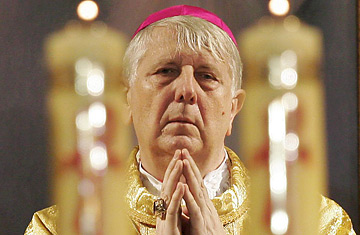
Stanislaw Wielgus, Janaury 2007
Wielgus has become the most famous victim of a process known as "lustration" — a word meaning "purification" — that is under way across eastern Europe. Embraced as a political weapon by right-wing parties against their enemies, it is targeting anyone with even remote ties to the communist past. In Poland this process has gained fresh momentum over the past year following the election of a right-wing, anti-communist coalition government led by twin brothers who began their careers battling communists alongside Lech Walesa and the Solidarity trade union movement. Cardinal Jozef Glemp, who is standing in for Wielgus until the Vatican names a replacement, said a witch-hunt is under way: "Today Archbishop Wielgus was tried. But what kind of trial is carried out on the basis of scraps of paper?" he told the congregation at St. John's after Wielgus stepped down. "We don't want such trials!"
Many Poles — up to two million — are known to have collaborated in some way with the secret police of the communist regime that ruled the country from 1945 to 1989. Often, those efforts did not amount to active spying. Communist agents would identify potential collaborators, including those who wanted to travel abroad or who sought posts over which the state had control, and ask them to sign papers indicating their willingness to pass on information. Some were threatened with the loss of their job or separation from their family if they did not cooperate. Wielgus's case may have been typical: he was approached by secret police after requesting permission to travel abroad to study and agreed to sign a paper indicating his willingness to pass on information. He has admitted doing as much but denies that he actually spied on colleagues.
The Catholic Church holds a particularly influential position in Polish society, and rumors about priests collaborating with the old regime, though common, have never been substantiated. In 1990 a large number of files held by the communist interior ministry on the Polish clergy mysteriously vanished. A former communist official later said they were handed over to the Church. More recently, a priest in Krakow named Tadeusz Isakowicz Zaleski, who was working on a book about priests in the Krakow diocese who cooperated with communist secret police, was ordered to be silent by Cardinal Stanislaw Dziwisz, the former personal secretary of Pope John Paul II. The late pontiff, while a strident anti-communist, was not unsympathetic to Polish priests who had cooperated with communists authorities, who then held absolute sway over his native land.
The Vatican watched the mounting Wielgus controversy over the past week and finally decided that it would be better to have the prelate go now rather than wait until after he was made Archbishop. Father Federico Lombardi, the Vatican spokesman, said the Pope had accepted the resignation because the Polish bishop's previous "behavior... had seriously compromised his authority." The result is a clear embarrassment for Pope Benedict XVI, who personally selected Wielgus for the post. Lombardi sought to spread the blame. He cited a "strange alliance" between former Communist authorities and their then adveraries who, he claims, are working to undermine the Church. "More than a sincere search for transparency and truth, the current wave of attacks against the Catholic Church in Poland contains many signs of ... a vendetta," Lombardi said .
Maybe. But the only evidence of a strange alliance in Poland is among ultra-right parties staunchly opposed to communism. The newspapers that leaked the stories about Wielgus's collaboration, such as the weekly Gazeta Polska, are all on the far right of the political spectrum. Wielgus's case may lead to fresh accusations against other members of the Polish church. The Vatican has hinted that new revelations may be coming and a new book about collaborating priests is due out in Poland in March.
with reporting by Jeff Israely/Rome
